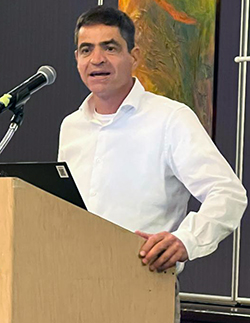By Donald H. Harrison


SAN DIEGO – Visiting San Diego State University History Prof. Yoav Alon is returning this weekend to Israel, a country which he fears within the next three or four years must make a profound choice.
One choice, he told an audience at Tifereth Israel Synagogue on Wednesday evening, Sept. 12, is to continue its war with the Palestinians. “It means that it (Israel) will become a pariah state and in the long term, perhaps also an apartheid state,” he said. “It will lose what is left of its authority in the Jewish world. What’s more, it means giving up on the original Zionist dream of creating a safe haven for Jews.”
In his talk sponsored by the United Synagogue of Conservative Judaism, Alon outlined the other choice as making “an earnest attempt to reach a peaceful settlement and this will have to be based on a two-state solution along the 1967 lines.”
Alon, whose academic-year-long teaching assignment in San Diego was arranged by the Murray Galinson San Diego-Israel Initiative (MGSDII), said young, liberal, well-educated Israelis are fed up with the constant wars with the Palestinians and such internal Israeli controversies as Haredim refusing to serve in the IDF while most secular Jews are conscripted.
The “Start-Up Nation” should become the “Re-Start nation,” the Tel Aviv University faculty member declared, otherwise these same young, well-educated, and liberal Israelis will forsake their homeland and take jobs in industries in Europe, the United States, and other western countries.
The historian looked to Israel’s history as well as to the history of other nations to find reasons for hope. Catastrophes often bring about positive developments, he said, citing the 1973 Yom Kippur War initiated by Egypt and Syria against Israel that resulted in the loss of 2,700 Israeli lives. It led to Egypt and Israel signing a peace treaty in 1979 with the help of U.S. President Jimmy Carter. The defeats of Germany and Japan in World War II led to both countries replacing authoritarian governments with democratic ones. Alon said “another example is from here, the American Civil War from which a great nation emerged. I do see a hopeful scenario.”
The civil resistance movement in Israel has mobilized many thousands of Israelis in opposition to Prime Minister Benjamin Netanyahu’s proposed changes in Israel’s judicial system, and now that movement demands that Israel prioritize the return of the hostages as a war aim in the Gaza conflict.
“The civil resistance movement might cultivate new priorities,” Alon said. He added that he is encouraged that Israeli Arabs and Jews, despite the tensions, “continue to live and work together. In this very moment, Arab doctors, nurses and other staff members of hospitals take care of injured IDF soldiers.” He said he senses that more and more Arabs are committed to Israel.
“Palestinians have also paid a high price in the ongoing war and throughout history. I believe they desperately wish for peace,” he said. “Younger forces are bound to emerge and challenge the old guard in Gaza and the ineffective Palestinian Authority.”
A two-state solution is preferable to a one-state solution for both the Israelis and Palestinians, he opined. “How can two people with such long history and much bad blood live together under the same regime?” Alon asked. “It didn’t work in Yugoslavia, so why would it work in the Holy Land?”
For a two-state solution to be achieved, “Palestinians and Israelis need the commitment and involvement of the world,” Alon said. “They need its help and friendly but persistent encouragement. It seems to me that many countries realize now that they cannot disengage from the conflict and are willing to take a more active part. The destruction of international waterways by the Houthis in Yemen [who say such actions are reprisals for the Gaza War] is one example why the world needs to help solve this conflict.”
“We need new people, new thinking,” Alon said.
*
Donald H. Harrison is publisher and editor of San Diego Jewish World.
It is Heisenberg that is being suggested: Palestine can either be a demilitarized country like Japan (was) or can continue to be a warrior state. I think you know between killing Jews or having sovereignty what 70% of Palestinians would choose and have chosen (see every poll from Gaza).
Facts aside: A UN/USA demilitarized zone along the 1967 Gaza border/Philadelphi corridor would be a good experiment with a militarized Gaza country. Then we can see what Palestinians choose without rosy glasses on. My guess is, unlike Israel, the US air force won’t knock before dropping bombs….